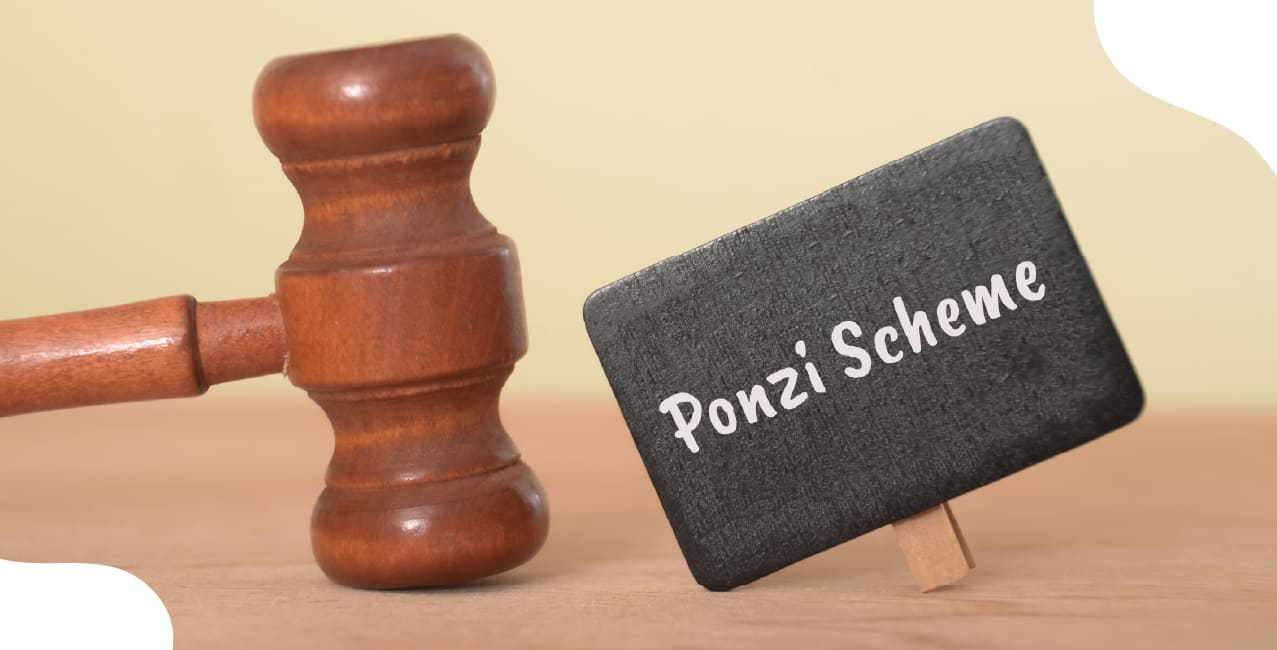What Is a Ponzi Scheme? Meaning, Examples & Risks

Check Your Loan Eligibility Now
By continuing, you agree to LoansJagat's Credit Report Terms of Use, Terms and Conditions, Privacy Policy, and authorize contact via Call, SMS, Email, or WhatsApp
Key Takeaways
- A Ponzi scheme is a fake investment plan where old investors are paid using money from new investors.
- It looks real at first, but it only works as long as fresh money keeps coming in.
- When the money stops, the scheme collapses, and most investors lose their savings.
A Ponzi scheme is a fake investment plan that pays earlier investors with money taken from new investors. It promises high returns with little to no risk, making it appear to be a great deal.
Think of it like a game where one friend borrows money from you, then uses your money to pay another friend who gave him money earlier. At first, it appears that everyone is making a profit, but this only works as long as new people continue to invest money. Once the new money stops, the whole plan collapses, and most people lose their savings.
This shows how early investors may seem to gain, but later ones usually face heavy losses when the scheme eventually falls apart.
If you know how these schemes work, you can catch them early and keep your money safe.
How Ponzi Schemes Work?
In a Ponzi scheme, the people running it attract investors by promising much higher returns than normal. Instead of earning profits, they use money from new investors to pay earlier ones. This makes it look like the scheme is working and everyone is winning.
Because investors believe they are really getting big profits, they often tell their friends and family to join in. The fraudsters sometimes focus on close-knit groups, such as community clubs or places of worship, to find more people to invest.
Unlike some scams, Ponzi schemes usually do not force you to bring in new members. However, your excitement about the “profits” can make you spread the word without realising you are helping the fraud grow.
A Ponzi scheme survives only as long as new money keeps coming in. Once it stops, the whole thing collapses, and most people lose their money.
Real-Life Example of a Ponzi Scam
Recently, in Alabama, USA, police caught a 23-year-old man from Gandhinagar, India, for running a Ponzi scam worth about $400,000. He convinced people to invest by promising very high profits and telling them their main money was completely safe.
But instead of investing it as promised, he spent the money on gambling, his personal needs, and paying earlier investors to make the scam look real. He even asked investors for extra fees, claiming it was needed to keep their investments active—yet none of the money was invested.
The man was not registered to sell investments in Alabama, and the contracts he gave people were also unregistered. This made the entire scheme illegal.
He tricked people with fake promises, used their money for himself, and broke the law, showing exactly how dangerous Ponzi schemes can be.
Warning Signs of a Ponzi Scheme
Ponzi schemes trick people into investing by promising easy money, but they often collapse, leaving investors with big losses. It is important to recognise the warning signs early.
Recognising these warning signs early can help you avoid scams and keep your money safe.
Bonus Tip: Always verify an investment with official regulators before putting in money. A quick background check can save you from losing your savings to scams.
What to Do If You've Been Caught in a Ponzi Scheme?
Discovering you've fallen victim to a Ponzi scheme can be devastating, both financially and emotionally. However, taking swift and decisive action can help minimise further damage and potentially aid in recovery efforts. The following guide outlines essential steps every victim should take immediately after realising they've been defrauded.
Immediate Actions for Ponzi Scheme Victims
If you realise you have fallen victim to a Ponzi scheme, acting quickly and wisely can make a huge difference in protecting both your money and your personal information. The table below highlights the most important steps to take, arranged by priority.
Taking these actions without delay not only reduces further damage but also strengthens your chances of recovering losses and supporting authorities in stopping such fraudulent networks.
Bonus Tip: Stay informed and share your experience. Warning others about the scheme can help protect more people from falling into the same trap.
The aftermath of a Ponzi scheme requires vigilance and careful financial planning. Victims often become targets for additional scams, making it crucial to remain alert to suspicious approaches. Focus on rebuilding your financial security through legitimate channels and seek professional advice when considering new investments.
Remember that recovery from financial fraud takes time, and whilst some funds may be recovered through legal proceedings, it's important to have realistic expectations. The most valuable lesson lies in recognising the warning signs that could prevent future victimisation.
Conclusion
A Ponzi scheme is a fraudulent investment plan that lures people with promises of high returns and low risk. It depends on money from new investors to pay earlier ones and ultimately collapses, causing most participants to lose their money. These schemes often hide their true operations and use secrecy to attract trust. By learning to spot the warning signs, you can avoid falling victim and keep your money safe.
FAQ’s
1. Do Ponzi schemes always collapse quickly?
Not always. Some collapse within months, while others can run for years, depending on how many new investors keep joining.
2. Can Ponzi schemes exist in small communities?
Yes. Many scams start locally, where fraudsters exploit trust among friends, family, or religious groups before spreading wider.
3. Are Ponzi schemes and pyramid schemes the same?
No. Both rely on new money, but Ponzi schemes usually have one organiser, while pyramid schemes require each participant to recruit others.
4. Why do intelligent people also fall for Ponzi schemes?
Scammers use emotions like trust, urgency, and greed. Even experienced investors can be fooled by fake documents and convincing stories.
5. Can technology make Ponzi schemes harder to detect?
Yes. Online platforms, social media, and cryptocurrency wallets allow fraudsters to reach more people and hide money faster than before.
Other Related Pages | |||
About the author

LoansJagat Team
Contributor‘Simplify Finance for Everyone.’ This is the common goal of our team, as we try to explain any topic with relatable examples. From personal to business finance, managing EMIs to becoming debt-free, we do extensive research on each and every parameter, so you don’t have to. Scroll up and have a look at what 15+ years of experience in the BFSI sector looks like.
Subscribe Now
Related Blog Post
Recent Blogs
All Topics
Contents
Quick Apply Loan
Consolidate your debts into one easy EMI.
Takes less than 2 minutes. No paperwork.
10 Lakhs+
Trusted Customers
2000 Cr+
Loans Disbursed
4.7/5
Google Reviews
20+
Banks & NBFCs Offers
Other services mentioned in this article








